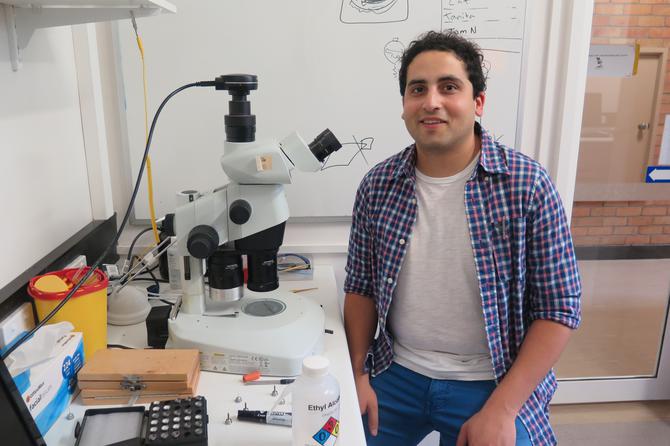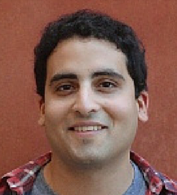Green chemistry may sound like an oxymoron, but it is an emerging field of research that could have a big impact on the future.
Dr Alex Bissember was the only Australian scientist awarded a Green Chemistry for Life research grant.
Just six researchers around the world received one of the 2015 grants from the United Nations Educational, Scientific and Cultural Organisation (UNESCO) under a joint programme with Russian company PhosAgro, and the International Union of Pure and Applied Chemistry (IUPAC).
The aim of the scheme is to support talented young scientists (under 35) who are working on green chemistry projects aimed at minimising (or even using) waste by-products, creating more energy-efficient chemical processes, and integrating environmentally-friendly technology with innovative ideas.
“As an early career researcher, it’s particularly challenging to secure funding and get your research program up and running. Any mechanism that can facilitate that is certainly appreciated,” Dr Bissember said.
So what is green chemistry?
Green chemistry is a relatively new concept. It is defined by the US Environmental Protection Agency as "the design of chemical products and processes that reduce or eliminate the generation of hazardous substances." One of the initiatives of the UNESCO funding scheme is to identify emerging researchers around the world who are at the beginning of their respective careers, and are initiating projects that fit into the area of green chemistry.
“This may mean developing processes that utilise cheaper, less toxic starting materials, or chemical reactions that provide fewer waste by-products," Dr Bissember said.
Dr Bissember said it’s often forgotten that everything is in fact a chemical.
“Green chemistry might sound like a strange phrase, but chemistry spans and positively impacts every aspect of your life.

UNESCO grant-winner Dr Alex Bissember said we often forget that chemistry positively impacts our lives every day.
Society might associate chemistry with ‘bad’ things, but the chemical industry is tremendously large and provides everything from plastics to perfume, dyes to pharmaceutical drugs, agricultural fertilisers, to the screen on your smartphone.
“It’s both good and bad that people don’t realise how big a role chemistry plays in society.
“It suggests that, for the most part, chemistry isn’t adversely impacting people’s lives, but at the same time it means the importance of these industries isn’t really appreciated.”
Dr Bissember said environmental concerns are becoming more prominent generally, and the field of chemistry is no exception.
“Environmental issues are becoming increasingly more important and almost every industry or sector in the world is facing them.
"The chemical industry is no different. For example, the safe disposal of waste is a significant problem and this has significant environmental and financial implications," he said.
“The chemical industry, therefore, has a lot to gain from improving the way they do things.”
Dr Bissember’s funded project, Development of new, viable and inexpensive visible light copper photocatalysts, is something he has been working on establishing since he arrived at UTAS in mid 2013.
“My research aims to develop new classes of visible light photocatalysts. These are metal complexes that absorb a photon of visible light, which enables them to access so-called ‘excited states.’ These species are then able to donate or accept electrons to or from other molecules. In this way, these photocatalysts can be used to shuttle electrons around a reaction mixture and, ultimately, facilitate the formation of new chemical bonds."
So what are molecules?
Molecules are made up of two or more atoms joined together by chemical bonds.
In some ways, this is similar to photosynthesis. Plants contain various metal complexes in their leaves and use them to convert energy from light into chemical energy. To a certain extent, we’re attempting to do the same thing in a flask. Although it is unlikely that we will ever do this as efficiently as nature.
“Visible light photocatalysis has recently re-emerged in chemistry as a powerful method for making organic molecules.
“These processes could have applications to many areas, from the synthesis of pharmaceuticals, to material science and aspects of solar technology."
Dr Bissember’s research may ultimately have applications to:
• The pharmaceutical industry, through the development of new chemical reactions or by making classes of biologically significant molecules more accessible and available, which is important in drug discovery
• Materials science, through the potential development of new methods for the preparation of polymers
• The renewable energy sector, through the potential development of more cost-effective solar cell sensitisers.
If you look at an industrial process, companies generally aim to do things the most cost-effective way possible. Both now and in the future, that’s typically going to coincide with the most environmentally benign process too.
So what are polymers?
Polymers are large molecules that are made up of many repeating units that are linked by chemical bonds. Plastics and resins are polymers.
“If you can minimise the waste that you’re generating, at the out-set, that’s going to be beneficial.”
In December, Dr Bissember met with the other grant recipients in Russia. He said building networks and collaborating is a “fundamental part of science.”
“It was a great experience, meeting people from every corner of the globe. We discussed our research, and the various challenges we faced at the beginning of our respective careers. One thing that is noticeable is that the challenges that everyone faces are pretty much the same, irrespective of their location in the world.
“Any sort of mechanism that can get you in a room with people that you might not normally meet is valuable.
“Being able to identify areas where you have similar interests is important and investigating collaborations is something we will definitely be exploring in the future."
Interested in making a difference? Apply now to become a research student.
